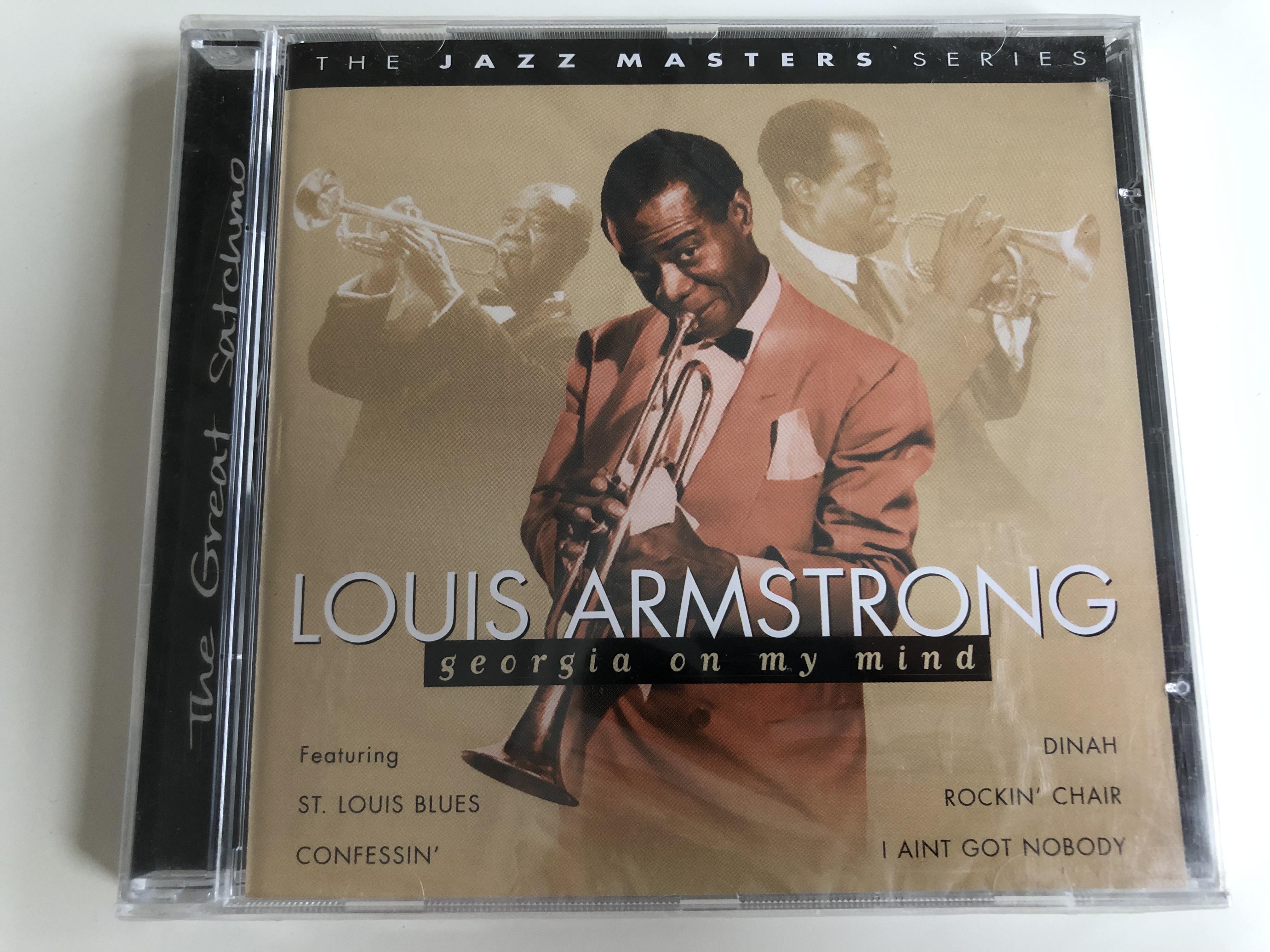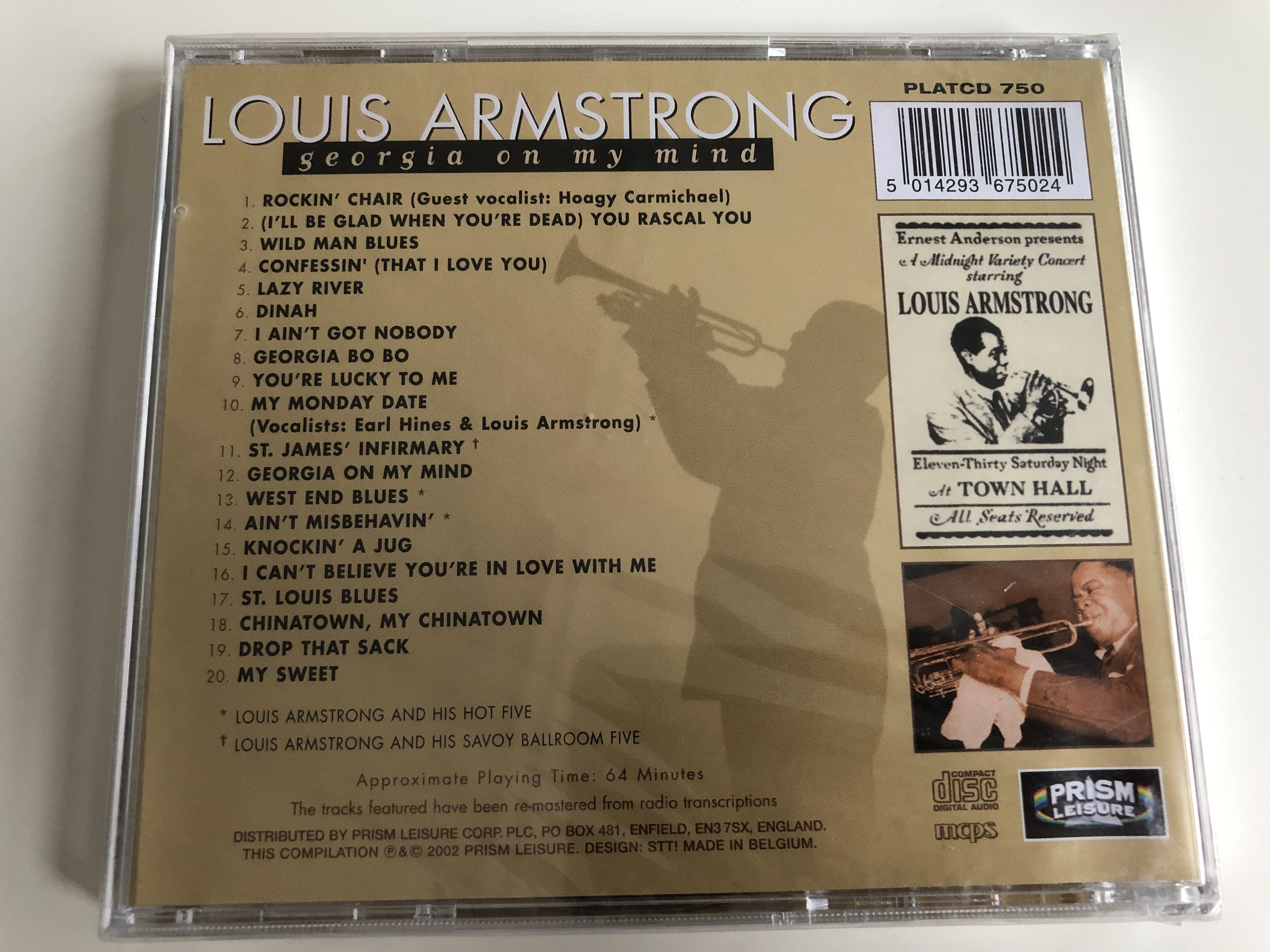Description
Luis Armstrong - Georgia on my mind
The Great Satchmo
The Jazz master series
AUDIO CD 2002
Featuring: ST. Louis blues, Confessin', Dinah, Rockin' Chair, I Aint got nobody
UPC 5014293675024
Tracklist:
Louis Daniel Armstrong (August 4, 1901 – July 6, 1971), nicknamed Satchmo, Satch, and Pops, was an American trumpeter, composer, vocalist and occasional actor who was one of the most influential figures in jazz. His career spanned five decades, from the 1920s to the 1960s, and different eras in the history of jazz. In 2017, he was inducted into the Rhythm & Blues Hall of Fame.
Armstrong was born and raised in New Orleans. Coming to prominence in the 1920s as an "inventive" trumpet and cornet player, Armstrong was a foundational influence in jazz, shifting the focus of the music from collective improvisation to solo performance. Around 1922, he followed his mentor, Joe "King" Oliver, to Chicago to play in the Creole Jazz Band. In the Windy City, he networked with other popular jazz musicians, reconnecting with his friend, Bix Beiderbecke, and made new contacts, which included Hoagy Carmichael and Lil Hardin. He earned a reputation at "cutting contests", and relocated to New York in order to join Fletcher Henderson's band.
With his instantly recognizable rich, gravelly voice, Armstrong was also an influential singer, demonstrating great dexterity as an improviser, bending the lyrics and melody of a song for expressive purposes. He was also very skilled at scat singing. Armstrong is renowned for his charismatic stage presence and voice almost as much as for his trumpet playing. Armstrong's influence extends well beyond jazz, and by the end of his career in the 1960s, he was widely regarded as a profound influence on popular music in general. Armstrong was one of the first truly popular African-American entertainers to "cross over", that is, whose skin color became secondary to his music in an America that was extremely racially divided at the time. He rarely publicly politicized his race, often to the dismay of fellow African Americans, but took a well-publicized stand for desegregation in the Little Rock crisis. His artistry and personality allowed him access to the upper echelons of American society, then highly restricted for black men.
Louis Armstrong (1901–1971), nicknamed Satchmo or Pops, was an American trumpeter, composer, singer and occasional actor who was one of the most influential figures in jazz and in all of American popular music. His career spanned five decades, from the 1920s to the 1960s, and different eras in jazz.
Coming to prominence in the 1920s as an "inventive" trumpet and cornet player, Armstrong was a foundational influence in jazz, shifting the focus of the music from collective improvisation to solo performance. With his instantly recognizable gravelly voice, Armstrong was also an influential singer, demonstrating great dexterity as an improviser, bending the lyrics and melody of a song for expressive purposes. He was also skilled at scat singing.
Renowned his charismatic stage presence and voice almost as much as for his trumpet-playing, Armstrong's influence extends well beyond jazz music, and by the end of his career in the 1960s, he was widely regarded as a profound influence on popular music in general. Armstrong was one of the first truly popular African-American entertainers to "cross over", whose skin color was secondary to his music in an America that was extremely racially divided. He rarely publicly politicized his race, often to the dismay of fellow African-Americans, but took a well-publicized stand for desegregation in the Little Rock Crisis. His artistry and personality allowed him socially acceptable access to the upper echelons of American society which were highly restricted for black men of his era.























